Benefits of Lone Time

Piyali Kanabar is into several fields related to education. She is a teacher straight from the heart, having served Bhavan's Bhagwandas Purohit Vidya Mandir as a teacher for over two decades. She’s also a corporate trainer and presently runs an institute in Nagpur catering to soft skills training and personality grooming called 'So What? A Center For Counseling and Professional Perfection'.
Piyali serves as a Cambridge Council examiner of BEC and trains students, professionals and housewives in spoken English. She also trains students for examinations like the IELTS, GRE, GMAT, PTE, SAT, TOEFL and CAT.
Piyali undertakes behavioural counseling and guidance. She is a member of the Nagpur Toastmasters Club at the Gold level and a member of India Peace Centre. She is involved with Seva kitchen, serving free homemade food to caretakers of patients.
The importance of spending lone time is unparalleled. This is the greatest opportunity you can give yourself to grow into a matured being, understanding finer details of life and weeding off the unwanted and unnecessarily complicating it.
Since my childhood till I completed my teens I had been a compulsive talker a literally suffering from verbal diarrhoea which often would put me in unwarranted embarrassments or futile arguments or being obviously ignored. Most of my friends would not opt to stick along for long with me as I would fail to keep secrets and carry stories without any discrimination, though I never consciously wanted to be a gossip monger.
Soon I realised that I kept on losing friends steadily as old people keep losing teeth. I didn't realise why, until my friends told me that they did not appreciate my practice of spreading tales.
As soon as I stepped out of my teens, I was married off.
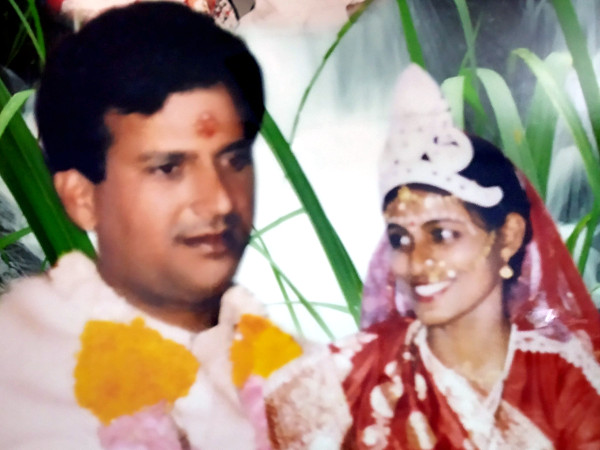
Piyali Kanabar with her husband on their wedding day.
I was amidst lots of complications, beginning with my father's failing health, I had to take a chunk of responsibilities of his health care as my mom would stay with him in the hospital and I would do the running around. This naturally this kept me too occupied to talk to anyone.
This was the time I began to cultivate the habit of spending 'lone time.'
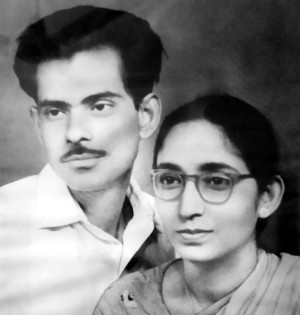
Piyali Kanabar's parents.
Married in a bigger family, adjusting in a completely new culture became a whole day engagement for me as it was an inter-caste one. I was caught in a precarious situation where people in my new family were literally compelled to love me because of my husband who would stand as a pillar of strength. This compelled me to listen more and talk less, I couldn't see this family commotion which was actually not very palatable.
This was the time I began to discover myself, my relationships along with other nuances of life. I soon understood that in the process of protecting me, the son of the family was getting most affected wherein I couldn't be any more so weak to succumb to family squabbles. I began to befriend them, trying to understand each one's emotional needs which made me realise that they didn't abhor me, but had a sense of insecurity. I tried to give them a lot of family time with their son; during this period I cultivated yet more habit to spend time with myself without shirking any of my responsibilities.
After whole days job, in the evenings I generally shunted between the two houses. This was a really trying time. I would feel extremely tired and live a lot of time with myself when my mom and son slept. The time I spent with myself began to increase, in the process I started enjoying my company all the more. I began to understand my potential. Soon I was falling in love with me. At the same time I could carry out all my duties without failing anywhere.
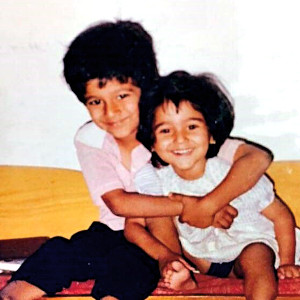
Piyali Kanabar's children at play.
Even during the time I was busy raising my kids; I just kept adding responsibilities but never left the previous ones. I was occupied with household chores, looking after my mother's declining health and also my kid, whom I provided sufficient company as a mom, teacher and playmate. In between I began to talk to myself only to decipher true Piyali. As soon I began to get sorted, I realised that fatigue was catching up with me, this was the time I got hypothyroidism (23yrs) after giving birth to my daughter. I learnt my first lesson: I needed to take greater care of me. I began to understand I needed both physical and mental rest.
Though I would spend a lot of lone time but I was only superficially quiet, as from within I was in constant conversation with myself and also with all the people I could imagine. Soon I realised my fault, as long as I was talking to myself it was okay but the conversation with others within myself was completely based on assumptions which I am sure, invariably did more harm than good to me.
I learnt the lesson of not assuming but analysing the facts first. I was evidently improving but intermittent mistakes which I committed, yes, were rich learning lessons for me. Quite reasonably I understood arguments or judging people got me nothing but tiring days.
By now I was also a fully fledged working woman; I learnt to let people be. I found that loose talk, even being in company of people who indulged in them were sickening. Still as I kept growing in my lone time with myself, it made me realise the value of a peaceful, happy life. I quite easily deciphered that it wasn't long but a happy life, what we ought to long for. I also learnt that in one's journey of life one has to walk alone and people who got support, which I did, should be grateful because it was a bonus.
I fought less, retaliated less, whenever I was misunderstood I remained contained in myself, finding any explanation by myself getting affected by other's behaviour to be redundant.
This was yet another frail time of my life, mother in death bed; myself, suffering from atypical tuberculosis in stomach; kids growing up; parents-in-law being shifted at my behest in my mother's house where we lived.
My husband was visibly disturbed but he couldn't openly oppose moving into my mother's house. He couldn't adjust to the new reality. As an escape mechanism he opted to stay away from home most of the day.
Now I began to observe behaviour of people and realised that their behaviours were the reflection of their upbringing to a large extent. It became an education for me to settle with everything which I had to face. It opened avenues for me to understand what I was comfortable with and also what I was looking for in my life. I became bolder and stronger and small talk didn't affect me anymore.
But after all this, I couldn't set myself free from expectations, and disappointment often gruelled me. I became more convinced to abandon those agonising little things from my life. I began to understand the unwarranted temperament of my husband, my mother's emotional outbursts, my parents-in-law's unusual demands, but by this time I knew what needed priority and acted accordingly. Not all of it went away together but little by little I could shed them out of my life.
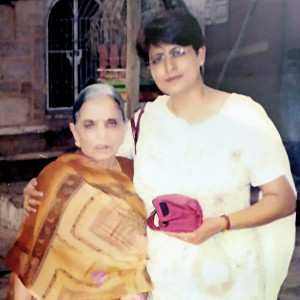
Piyali Kanabar with her mother-in-law.
Gradually, in a span of 10 years I lost my mother. The loss of my mother shattered me. I found myself helpless for the first time in my life. Death became an easy word for me and it never bothered me anymore.
After three years my father-in-law passed away and after another 10 years my mom-in-law as well. Again, it was very disturbing. With her passing away all of a sudden I had become the first lady of the house; but I lost a friend, which my mom-in-law had become for me.
I understood the importance of spending lone time all the more.
By now my kids were married. I had a daughter-in-law and a son-in-law. I understood this was the time which would demand to let my son and daughter to be left free to live their lives and my involvement had to be withdrawn with grace to keep the love and affection alive.
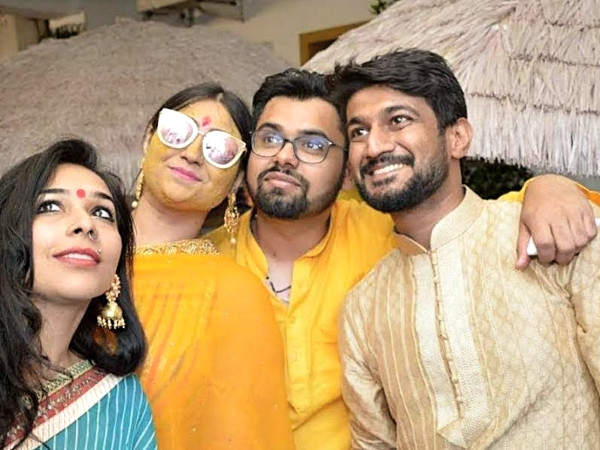
Piyali Kanabar's children with their respective spouses. From left to right: daughter-in law, daughter, son-in-law, son.
I now had even more time to myself, alone and composed, I learnt yet another lesson that fathers and mothers had a completely different perspective about life, barring some.
My thoughts were my lone thoughts and were not to be thrust on others.
These days I began to understand the worth of lone time better. I spent my time on activities which I enjoyed. This was the entry to a completely soulful, satisfying time where I played several characters and am thoroughly to myself.
Life is still in progress.
Do you know the best thing what I have learnt? I have learnt to live with myself even in a crowd.
Comments
A life well lived
It's your story - but I think it represents a group of Indian women who have juggled many roles as India has modernized but still retained many traditional roles and practices. Comes through very clearly in a simply frank way. Thank you.
Completely Agree with Subodh
Completely Agree with Subodh Mathurji..
Also, when you read about others struggles and pains.. you learn a lot from their learning’s/ experiences and also realise that you must be grateful with what you have in your own life!
Proud of you Piyali Ma’m, you have lived your life to the fullest and there is still a scope of lot more pride, and liveliness!! Best wishes!!
Comments
I am in agreement with you Maám. As our species is considered as primates, we genetically tend to live in groups or in society. So it is not easy to live or spend time in alone. But sometimes you need to sit lonely on the floor in a quiet room in order to hear your own voice and not let it drown in the noise of others. It is solitude that allows you to withdraw from the racket of the world and find out who you are. In the ancient time the great saints like Buddha and others used to remove themselves from the crowds to be alone and meditate. You have very nicely depicted your thought on the issue. This is the power of spending lone time.
Add new comment